
Mojito is a traditional Cuban punch. The cocktail often consists of five ingredients: white rum, sugar, lime juice, soda water, and mint. Its combination of sweetness, citrus, and herbaceous mint flavors is intended to complement the rum, and has made the mojito a popular summer drink.
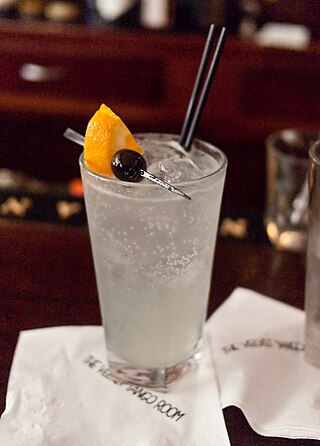
The Tom Collins is a Collins cocktail made from gin, lemon juice, sugar, and carbonated water. This "gin and sparkling lemonade" drink is typically served in a Collins glass over ice with a cherry garnish. A non-alcoholic "Collins mix" mixer is produced, enjoyed by some as a soft drink.
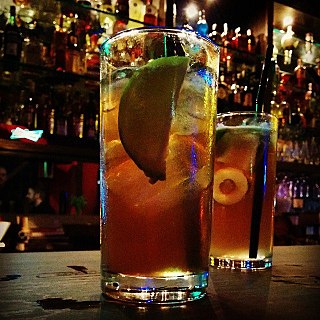
The Long Island iced tea, or Long Island ice tea, is an IBA official cocktail, typically made with vodka, tequila, light rum, triple sec, gin, and a splash of cola. Despite its name, the cocktail does not typically contain iced tea, but is named for having the same amber hue as iced tea.

French 75 is a cocktail made from gin, champagne, lemon juice, and sugar. It is also called a 75 cocktail, or in French simply a soixante quinze.
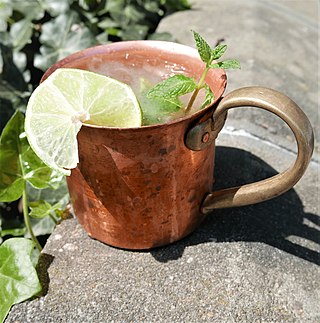
A Moscow mule is a cocktail made with vodka, ginger beer and lime juice, garnished with a slice or wedge of lime, and a sprig of mint. The drink, being a type of buck, is sometimes called vodka buck. It is popularly served in a copper mug, which takes on the cold temperature of the liquid.

The sidecar is a cocktail traditionally made with brandy, orange liqueur, and lemon juice. It became popular in Paris and London in the early 1920s. Common modifications of the original recipe are a sugar rim, added sugar syrup, and an orange twist or lemon twist.

The martini is a cocktail made with gin and vermouth, and garnished with an olive, a lemon twist, or both. Over the years, the martini has become one of the best-known mixed alcoholic beverages. A common variation, the vodka martini, uses vodka instead of gin for the cocktail's base spirit.

The Singapore sling is a gin-based sling cocktail from Singapore. This long drink was reputed to have been developed in 1915 by Ngiam Tong Boon, a bartender at the Long Bar in Raffles Hotel, Singapore. It was initially called the gin sling.
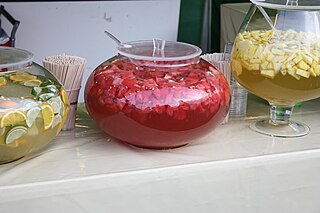
The term punch refers to a wide assortment of drinks, both non-alcoholic and alcoholic, generally containing fruits or fruit juice. The drink was introduced from the Indian subcontinent to England by employees of the East India Company in the late 17th century. Punch is usually served at parties in large, wide bowls, known as punch bowls.

A sour is a traditional family of mixed drinks. Sours belong to one of the old families of original cocktails and are described by Jerry Thomas in his 1862 book How to Mix Drinks.

White lady is a classic cocktail that is made with gin, Cointreau or triple sec, fresh lemon juice and an optional egg white. It belongs to the sidecar family, made with gin in place of brandy. The cocktail sometimes also includes additional ingredients, for example egg white, sugar, cream, or creme de menthe.
A Scorpion Bowl is a communally shared alcoholic tiki drink served in a large ceramic bowl traditionally decorated with wahine or hula-girl island scenes and meant to be drunk through long straws. Bowl shapes and decorations can vary considerably. Starting off as a single-serve drink known as the Scorpion cocktail, its immense popularity as a bowl drink in tiki culture is attributed to Trader Vic.

The Fine Art of Mixing Drinks is a book about cocktails by David A. Embury, first published in 1948. The book is noteworthy for its witty, highly opinionated and conversational tone, as well as its categorization of cocktails into two main types: aromatic and sour; its categorization of ingredients into three categories: the base, modifying agents, and special flavorings and coloring agents; and its 1:2:8 ratio for sour type cocktails.

A "fizz" is a mixed drink variation on the older sours family of cocktail. Its defining features are an acidic juice and carbonated water. It typically includes gin or rum as its alcoholic ingredient.
Curaçao punch is a cocktail that comes from Harry Johnson's New and Improved Bartender's Manual (1882). Dale DeGroff, a notable bartender and author of The Craft of the Cocktail, holds this to be his favorite forgotten potation.
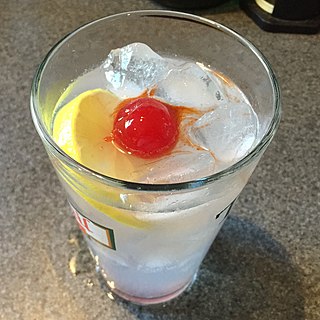
A John Collins is a long drink of London dry gin, lemon juice, sugar and carbonated water, which was attested in 1869, but may be older. It is believed to have originated with a headwaiter of that name who worked at Limmer's Old House in Conduit Street in Mayfair, which was a popular London hotel and coffee house around 1790–1817. It is essentially a variant of Tom Collins, evidently a latter name for the same drink.

The doctor cocktail is a pre-prohibition era cocktail that traces in drink guides to as far back as 1917, when it appeared in Hugo R. Ensslin's Recipes for Mixed Drinks. As originally described the cocktail called simply for Swedish Punsch mixed with lime juice.

The Airmail or Air Mail is a classic cocktail based on rum, lime or lemon juice, honey, and sparkling wine. It was probably created during or shortly after the period of prohibition in the United States of America or on Cuba, i.e. in the 1920s or 1930s.

















